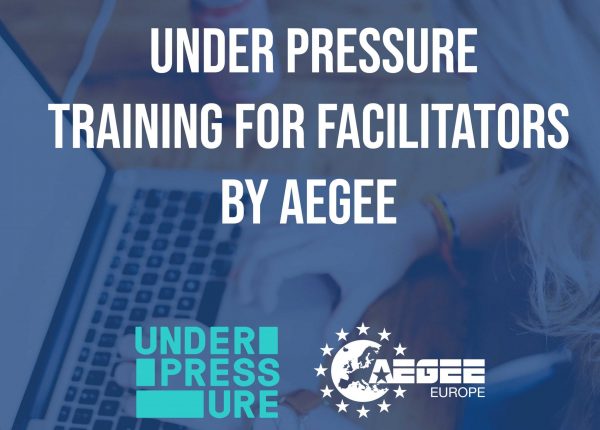

In this three part series of blogposts, PEGAP partner AEGEE, reports on their experiences in training non-formal education experts to use the Under Pressure methodology in different settings.
On 18-20 September 2020, AEGEE-Europe hosted the online Under Pressure Training for Facilitators with the support of Diversion and DROG. This 3-day training event targeted young adults with experience in non-formal education and was led by two experienced trainers from AEGEE-Academy. The event could also count on the contribution from a guest peer education trainer from Diversion. Although the training gathered less participants than initially hoped for, meaningful interactions and sharing of experiences and knowledge were ensured through the use of non-formal education methods and thanks to the proactiveness of the participants, organisers and trainers.
The objectives of this training for facilitators were twofold. On the one hand, the event aimed at strengthening resilience to fake news and disinformation among the participants by increasing their knowledge of the way such news are created and spread, by encouraging critical thinking and responsible use of media, as well as by reflecting on possible approaches to counter fake news and disinformation. On the other hand, the event also aimed at empowering the participants to use the Under Pressure methodology themselves and to host sessions on the topics at stake in their own communities following the training.
Over the summer 2020, PEGAP project partners led by AEGEE had set to create an adapted Under Pressure methodology targeting young adults and integrating non-formal education methods along with the peer education approach (read more about it here). This training for facilitators was thus also a good occasion to test the adapted methodology in its entirety for the first time.
The goal of this event is to empower participants to host sessions on these topics in their own communities.
The first day of the training event started with an introduction to the project and objectives of Under Pressure, followed by get-to-know-each-other activities which were also a good occasion for the participants to start reflecting on their relation to fake news and to share their expectations for the training event. Then, the participants had the chance to learn more about the social norm theory, peer education conversation tools and personal storytelling through a session hosted by the guest trainer. This session highlighted the value of peer education and the importance of creating a safe setting, of asking the right questions and of sharing real personal experiences while also setting boundaries for oneself as to how far we are ready to go. The training participants were also invited to think about their own life experiences and to prepare themselves to share one relevant personal story on the last day of the training.
The second half of this first day started with a session on opinion formation and the concept of filter bubbles. The participants identified and reflected on values and driving forces in their environments, friends and family circles that influence them and have an impact on their opinion formation. It was pointed out that filter bubbles exist both in actual everyday life and on social media, and that these filter bubbles are also used by companies and other entities trying to catch our attention and to influence us. In the following session, the participants further reflected on their relations with fake news and learnt more about the different types of inaccurate information and their identifiable features and characteristics. This newly acquired knowledge was put into practice through an exercise on identifying and categorising real articles spreading inaccurate information. The importance of critical thinking and of considering information from different angles was then also put into focus through an exercise encouraging the participants to look beyond their usual understanding of common signs and symbols.
To conclude this first training day, the participants put themselves in the shoes of fake news mongers by playing the Under Pressure game! In this online game, the players impersonate unscrupulous media magnates and try to get as many followers as they can while slowly building up fake credibility as a news site. The Under Pressure game also introduced the participants to the concepts and techniques of impersonation, manipulation, polarisation, conspiracy, discredit and trolling. White being on the other side of fake news brought some dilemmas among participants, this experience also helped them better understand how fake news are created and spread, identify techniques commonly used, and reflect on the impact that fake news can have online and in real life.